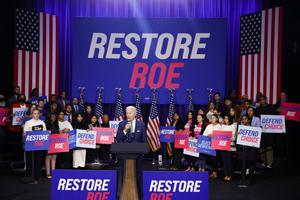Biden Triples Down on Abortion Ahead of Midterms While Voters Cite Economy as Top Issue
Contrary to the current administration’s fixation on promoting its pro-abortion policies, new polling indicates declining voter interest, with several other issues ranking as more pressing concerns.

In yet another example of his extreme pro-abortion intransigence, President Joe Biden made a promise to voters Tuesday that if they elect a majority of Democrats in Congress, “the first bill that I will send to the Congress will be to codify Roe v. Wade.”
Our nation’s Catholic president was speaking in front of signs that read “Restore Roe” at a Democratic National Committee event where he stated that on the abortion issue “come this November we’re going to see what happens all over America, God willing,” and told voters they had the power to “restore the right to choose for every woman in every state in America.”
This event is just the latest in the Biden administration’s focus on the issue weeks ahead of the midterm elections as they hope the opposition to the Supreme Court’s decision in the Dobbs case overturning Roe will drive Democratic voter turnout. Vice President Kamala Harris has now participated in more than 20 events focused on abortion rights since the leaking of the draft decision in the Dobbs case in May.
However, according to the latest polling, the abortion issue is not a top concern for U.S. voters. A recent New York Times/Siena College poll had 26% of voters listing the economy as the most important problem facing the country today with 18% naming inflation and just 5% citing abortion. The Times noted that “with inflation unrelenting and the stock market steadily on the decline, the share of likely voters who said economic concerns were the most important issues facing America has leaped since July, to 44 percent from 36 percent — far higher than any other issue.”
A recent CBS/Yougov poll found that “over the last month, Democrats haven't grown the number of voters who see abortion as very important” and “the percentage who say abortion is very important is actually a little lower now than last month.” In September, 59% of those surveyed said abortion was very important, but this month 54% of voters called it very important. In this month’s poll, the economy, 80%, inflation, 76%, crime, 68%, voting and election issues, 65%, gun policy, 62%, and immigration, 61% all ranked ahead of abortion as very important for the majority of those surveyed.
Additionally, while President Biden has been employing the rhetoric of “restoring” the abortion access permitted under Roe v. Wade, the legislation he has backed would go far beyond it. In May, he backed the Women’s Health Protection Act, a measure that would bar almost any state limitations on abortion, including “a prohibition on abortion at any point or points in time prior to fetal viability ... a prohibition or restriction on a particular abortion procedure,” and even “a prohibition on abortion after fetal viability when, in the good-faith medical judgment of the treating health care provider, continuation of the pregnancy would pose a risk to the pregnant patient’s life or health.”
Americans widely support limits on abortion past the first trimester. In a May 2022 Gallup poll, most voters thought it should be limited to the first trimester, 71% of voters thought abortion should be illegal in the third trimester, and 55% thought it should be illegal in the second trimester. A Harvard Harris survey conducted in June 2022, after Roe v. Wade was overturned, found that 72% of voters, including 60% of Democratic voters, thought their state should not allow abortion past 15 weeks.
When does President Biden support abortion limits? White House Press Secretary Karine Jean-Pierre was asked Tuesday, “are there any restrictions whatsoever that the president would support when it comes to abortion?” She replied, “He believes in the provisions that Roe had and that’s where he stands.”
However, the viability standard established in Roe v. Wade is disconnected with most Americans’ views on abortion. It only permitted limits on abortion after “viability” and the court defined viable as “potentially able to live outside the mother’s womb, albeit with artificial aid.”
In the Dobbs decision, the justices rejected the viability standard and noted that “viability has changed over time and is heavily dependent on factors — such as medical advances and the availability of quality medical care — that have nothing to do with the characteristics of a fetus.” Justice Samuel Alito, who wrote the majority decision, pointed out that “when Roe was decided, viability was gauged at roughly 28 weeks. Today, respondents draw the line at 23 or 24 weeks. So, according to Roe’s logic, States now have a compelling interest in protecting a fetus with a gestational age of, say, 26 weeks, but in 1973 States did not have an interest in protecting an identical fetus.” Justice Alito concluded that “the viability line, which Casey termed Roe’s central rule, makes no sense, and it is telling that other countries almost uniformly eschew such a line.”

















